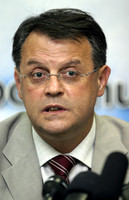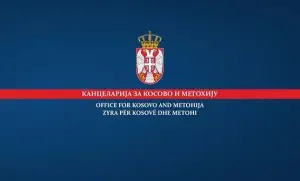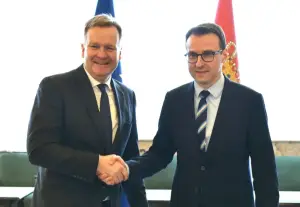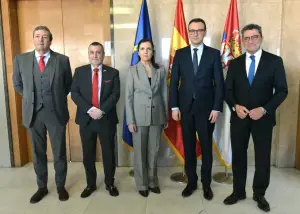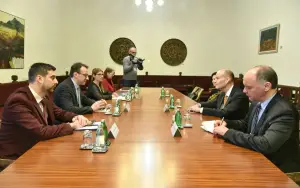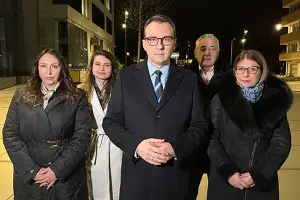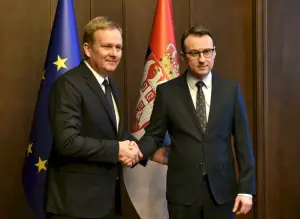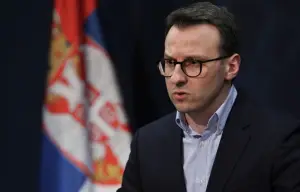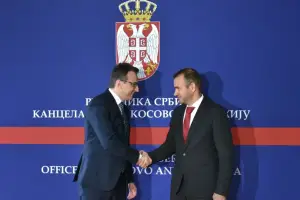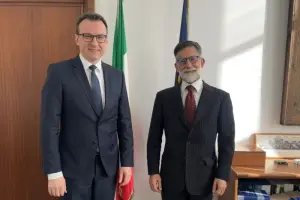Q:
A:
No lasting solution to Kosovo-Metohija without Belgrade
Belgrade/Brussels,
26 January 2005
Head of the Coordinating Centre for Kosovo-Metohija Nebojsa Covic said last night that there can be no lasting or sustainable solution for Kosovo-Metohija without an active role for Belgrade.
Covic told the external relations committee of the European Parliament in Brussels that the Belgrade authorities will strongly oppose any change of borders and will insist on a full respect of territorial integrity and sovereignty of all countries in the region.
“However, the international community’s resolve in the steps it is taking in Kosovo-Metohija has started to depend largely on whether the ethnic-Albanian majority will like them or not and whether those steps will provoke their discontent or a violent reaction,” Covic stressed.
He warned that such an approach is wrong and dangerous, given that the process of resolving the Kosovo crisis is far from being completed and he added that in that process there must not be compromises resulting from threats with violence.
According to him, despite initial interpretations suggesting that assessments of the success in achieving standards will be repeated as many times as necessary and that talks on the status will not be launched until standards are implemented in full, there are hints already that a green light for launching talks will be given even though the standards are not expected to be achieved.
Covic said that Belgrade and Kosovo Serbs are being sidelined through a hardline stand towards Belgrade and controversial decisions that hinder its constructive participation in the ongoing process – such as the appointment of Ramush Haradinaj as Kosovo’s prime minister and electricity cuts in Serb enclaves.
Covic warned that sidelining Serbs from all processes may lead to blaming them for lack of results in the implementation of standards.
He recalled that both Belgrade authorities and Kosovo Serbs and other non-Albanians have welcomed the “standards before status” policy and that they have tried to install those elements that would be crucial for the return and survival of Serbs and other non-Albanians in Kosovo-Metohija.
"Many of these elements were not included in the Plan for Implementing Kosovo-Metohija standards. These standards were, in spite of the opposition of Belgrade and the Serb community in Kosovo-Metohija, defined imprecisely and immeasurably, which has allowed for the dangerous possibility of the assessment of the success of their implementation, as a condition for beginning talks on the final status, to be a topic of arbitrary judgment and does not give a realistic impression of the situation in the field", said Covic.
He underlined that more than five years have passed since the arrival of international forces to Kosovo-Metohija, and there is still no security and freedom of movement for Serbs and other non-Albanians. Their ownership rights are not respected, the fate of missing and kidnapped persons is still unknown. The perpetrators of ethnically motivated crimes have not been brought to justice, and displaced persons cannot return to their homes.
"UN Security Council Resolution 1244 gave UNMIK and KFOR mandate to help establish considerable autonomy and self-government in Kosovo-Metohija, to protect and promote human rights and to secure and promote the safe and undisturbed return of all refugees and displaced persons, and not to create an independent state", underlined the Head of the Coordinating Centre.
Before he addressed the European Parliament, Covic talked with EU High Representative for the Common Foreign and Security Policy Javier Solana and underlined that Belgrade should be included in resolving the process in Kosovo-Metohija, which under no circumstances should lead to the independence of the southern province, rather to the implementation of UN Security Council Resolution 1244.
After talks with Solana, the Head of the Coordinating Centre said that he was encouraged by his positive stand and desire to help resolve the problem in Kosovo-Metohija.
“However, the international community’s resolve in the steps it is taking in Kosovo-Metohija has started to depend largely on whether the ethnic-Albanian majority will like them or not and whether those steps will provoke their discontent or a violent reaction,” Covic stressed.
He warned that such an approach is wrong and dangerous, given that the process of resolving the Kosovo crisis is far from being completed and he added that in that process there must not be compromises resulting from threats with violence.
According to him, despite initial interpretations suggesting that assessments of the success in achieving standards will be repeated as many times as necessary and that talks on the status will not be launched until standards are implemented in full, there are hints already that a green light for launching talks will be given even though the standards are not expected to be achieved.
Covic said that Belgrade and Kosovo Serbs are being sidelined through a hardline stand towards Belgrade and controversial decisions that hinder its constructive participation in the ongoing process – such as the appointment of Ramush Haradinaj as Kosovo’s prime minister and electricity cuts in Serb enclaves.
Covic warned that sidelining Serbs from all processes may lead to blaming them for lack of results in the implementation of standards.
He recalled that both Belgrade authorities and Kosovo Serbs and other non-Albanians have welcomed the “standards before status” policy and that they have tried to install those elements that would be crucial for the return and survival of Serbs and other non-Albanians in Kosovo-Metohija.
"Many of these elements were not included in the Plan for Implementing Kosovo-Metohija standards. These standards were, in spite of the opposition of Belgrade and the Serb community in Kosovo-Metohija, defined imprecisely and immeasurably, which has allowed for the dangerous possibility of the assessment of the success of their implementation, as a condition for beginning talks on the final status, to be a topic of arbitrary judgment and does not give a realistic impression of the situation in the field", said Covic.
He underlined that more than five years have passed since the arrival of international forces to Kosovo-Metohija, and there is still no security and freedom of movement for Serbs and other non-Albanians. Their ownership rights are not respected, the fate of missing and kidnapped persons is still unknown. The perpetrators of ethnically motivated crimes have not been brought to justice, and displaced persons cannot return to their homes.
"UN Security Council Resolution 1244 gave UNMIK and KFOR mandate to help establish considerable autonomy and self-government in Kosovo-Metohija, to protect and promote human rights and to secure and promote the safe and undisturbed return of all refugees and displaced persons, and not to create an independent state", underlined the Head of the Coordinating Centre.
Before he addressed the European Parliament, Covic talked with EU High Representative for the Common Foreign and Security Policy Javier Solana and underlined that Belgrade should be included in resolving the process in Kosovo-Metohija, which under no circumstances should lead to the independence of the southern province, rather to the implementation of UN Security Council Resolution 1244.
After talks with Solana, the Head of the Coordinating Centre said that he was encouraged by his positive stand and desire to help resolve the problem in Kosovo-Metohija.

